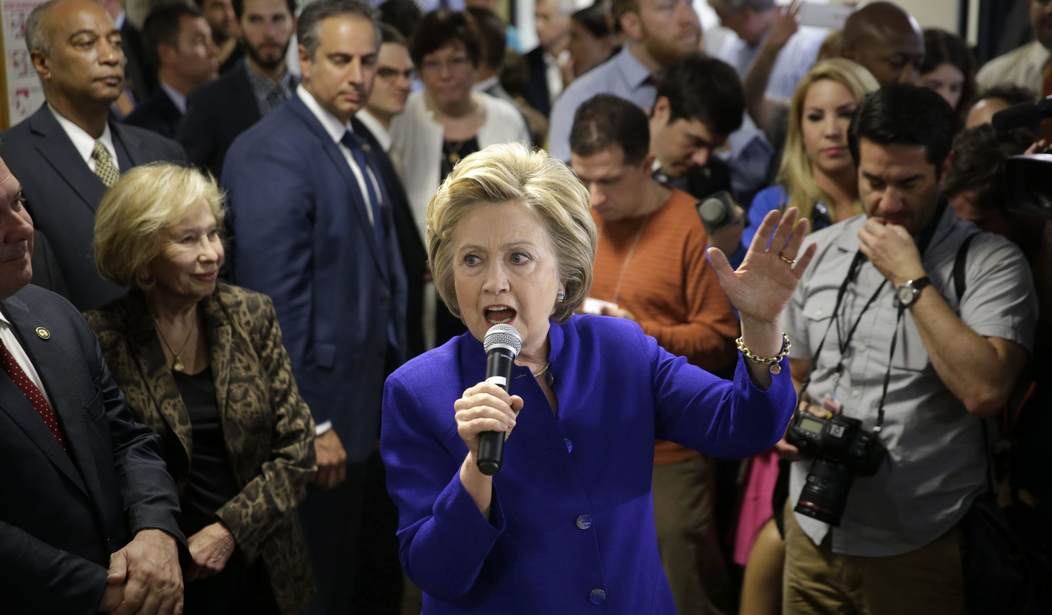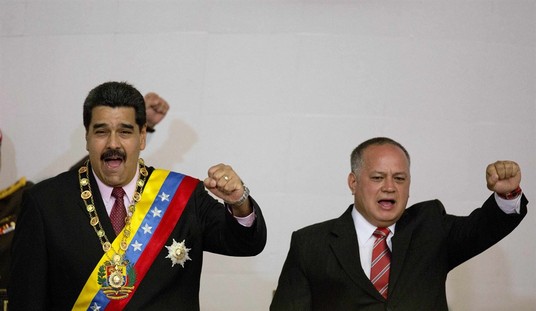Conservative Christian support for Donald Trump has become something of a scandal of late. But no matter how odious the Republican nominee’s faults may be, religious believers must not be fooled — Hillary Clinton represents a terrifying threat to religious freedom and traditional faith in general.
Last April, Clinton infamously declared that “deep-seated cultural codes, religious beliefs, and structural biases have to be changed” in order to make way for abortion and other forms of “reproductive health care.” These remarks, given at the sixth annual Women in the World Summit, are fully in keeping not only with other denigrating speeches she has given about religious beliefs, but even with her colleagues’ political work behind the scenes, as recently revealed by WikiLeaks.
For years, Clinton and her associates have demonstrated a contempt for traditional religious beliefs and an insidious effort to change them by whatever means necessary.
One such effort was revealed by WikiLeaks. In an email from February 2012, Sandy Newman, president and founder of the progressive nonprofit Voices for Progress, wrote to John Podesta (now Clinton’s campaign chairman) that “there needs to be a Catholic Spring [like the Arab Spring], in which Catholics themselves demand the end of a middle ages dictatorship and the beginning of a little democracy and respect for gender equality in the Catholic Church.”
Podesta, rather than dismissing the idea of infiltrating a Christian church and trying to force it to reject longstanding doctrine, said he had already attempted to do this. “We created Catholics in Alliance for the Common Good to organize for a movement like this. Likewise Catholics United,” he replied. The first group Podesta mentioned, Catholics in Alliance for the Common Good, is funded by George Soros and pushes left-wing ideologies which are inconsistent with Catholic doctrine.
In another email to Podesta, from March 2011, Center for American Progress fellow John Halpin argued that conservative Catholics “must be attracted to the systematic thought and severely backwards gender relations and must be totally unaware of Christian democracy.” (emphasis added.)
Jen Palmieri, now Clinton’s communications director, responded, “I imagine they think it is the most socially acceptable politically conservative religion. Their rich friends wouldn’t understand if they became evangelicals.” Halpin responded, “Excellent point. They can throw around ‘Thomistic’ thought and ‘subsidiarity’ and sound sophisticated because no one knows what the hell they’re talking about.”
As an evangelical Protestant, I am both familiar with those ideas, and offended on behalf of my Catholic “separated brethren.” Much of the way Americans see the world is heavily influenced by St. Thomas Aquinas, and the Founding Fathers’ idea of federalism arguably traces back to subsidiarity.
Next Page: Clinton herself compared opposition to the LGBT agenda to honor killings and female genital mutilation.
But some of the most offensive attacks have come directly from Clinton herself. In a speech given in December 2011, Clinton openly compared religious opposition to the LGBT agenda to honor killings, widow burning, and female genital mutilation.
The third, and perhaps most challenging, issue arises when people cite religious or cultural values as a reason to violate or not to protect the human rights of LGBT citizens. This is not unlike the justification offered for violent practices towards women like honor killings, widow burning, or female genital mutilation. Some people still defend those practices as part of a cultural tradition. But violence toward women isn’t cultural; it’s criminal. Likewise with slavery, what was once justified as sanctioned by God is now properly reviled as an unconscionable violation of human rights. [Emphasis added]
In other words, if religious people oppose gay marriage and special legal protections for transgender people, that is tantamount to religious violence and morally comparable to honor killings and slavery. This interpretation is extremely uncharitable to religious conservatives, who do not hesitate to condemn violence against homosexuals, and who most strongly object to being forced to partake in gay weddings, which they see as a violation of religious freedom.
In case you think this is all ancient history (emails from 2011 and 2012, a speech from 2011, and a speech from 2015), read Clinton’s words to the LGBT magazine The Advocate in July of this year:
America was founded on religious freedom. It’s enshrined in our Constitution. And the Equality Act, for example, advances LGBT equality while maintaining religious exemptions that have been part of our civil rights laws for decades. So this should not be an either/or question.
Sounds good, right? Not quite. Clinton says she supports religious freedom, but then repeats the “discrimination” line so painfully familiar to religious Americans.
Now, the concerted effort underway in a number of states to discriminate against LGBT people under the guise of protecting religious freedom is something very different. It’s insincere and insidious. And we shouldn’t let it stand.
As president, I will fight to make sure all Americans can live their lives free from discrimination, including LGBT Americans.
Here’s the problem — the laws which promote religious freedom do not discriminate against LGBT people. The religious freedom laws only allow businesses to refuse to serve gay weddings (when they have a religious exemption, and since there are many other businesses which will happily do so), and allow churches to operate on their beliefs that people are born male and female and should not change their gender.
The “discrimination” line itself is “insincere and insidious,” as are Clinton’s efforts to force change in religious doctrines.
These declarations present Hillary Clinton as a radical opponent of religious freedom. We’re not just talking about “clinging to their guns and their religion” rhetoric for which President Obama is notorious. No, Clinton and her team have advocated subversion of Christian churches.
Clinton isn’t just arguing that Christians “discriminate” against gay people, she’s effectively saying that it is the government’s job to make them conform. She is equating Christians’ unwillingness to support special laws for LGBT people to physical abuse against women. This isn’t just an insult — it’s a hateful, odious lie that makes enemies of all religious conservatives.
Next Page: Where Clinton’s view comes from, and why it is so wrong.
To be fair, Clinton’s view makes some sense. From a liberal standpoint, conservatives who accept the Bible’s view that homosexual acts and transgender surgery are sinful are stuck in the past. Since LGBT activists are “on the right side of history,” their movement will succeed, and one day religious conservatives will look back on these benighted times with the same moral revulsion with which they now remember the Christian justifications for slavery in the 1800s.
The problem with this view is that it assumes way, way too much. Slavery is a morally ambiguous question in the Bible. Yes, the biblical books of Colossians, Ephesians, and 1 Peter all urge slaves to obey their masters. But in the book of Philemon, Saint Paul encourages a master to accept the escaped slave Onesimus back “not as a slave, but as a brother.”
Furthermore, slavery was endemic in the ancient world, and was a universal feature of human societies until the 800s A.D. when the first Christian abolitionist movement ended the practice in Europe for a time. Then, in the 1800s, Christians like William Wilberforce led the modern abolitionist movement. Slavery is not explicitly condemned in the Bible, but Christians have sacrificed everything — in multiple centuries — to end the practice.
Homosexuality and transgenderism are not so ambiguous. Romans 1 makes clear that homosexual acts are sinful — a penalty for separation from God and a sin with its own consequences. (An aside, this passage does not call for the execution of homosexuals, as The New York Times ignorantly reported.) When it comes to transgenderism, Genesis and the words of Jesus agree that God created humans male and female, and that sexuality is a gift from God.
This does not mean that people who struggle with homosexual attraction or with the sense that they were born in the wrong body are irredeemable or not worthy of Christian charity. All Christians are sinners, and are called to offer God’s forgiveness to the repentant. Christians are also called to love and serve our fellow human beings, no matter how sinful.
Believers are not to take a holier-than-thou attitude or to mistreat LGBT people in any way, and that is not what religious freedom laws are about. Christian bakeries should not — and do not — deny service to people because they are gay or transgender. That would be discrimination. They can — and some should — deny service for gay weddings, however, because those are public events and their participation would imply an agreement with homosexual acts in a union.
Furthermore, statutes to make sure that pastors refer to transgender people by their chosen pronouns are oppressive, to some degree. The idea that leaders who do not believe a man can become a woman should be forced to refer to a man as a woman, in violation of their religious principles, is not in keeping with religious freedom. That is not to say a pastor will not decide, in the interests of courtesy and politeness, to do so of his own accord.
The biggest problem with Clinton’s approach is that it is exactly what secular progressives accuse Christians of being — morally narcissistic. It not only assumes that her moral positions are correct, but also that there is no justification behind conservative beliefs besides bigotry.









Join the conversation as a VIP Member